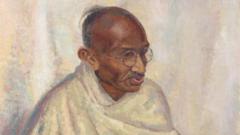The auction of priceless Buddha-related gems has been postponed by Sotheby's following an official intervention from India, emphasizing the need for dialogue on heritage rights.
Sotheby's Cancels Buddha Jewels Auction Amid Indian Government Threat

Sotheby's Cancels Buddha Jewels Auction Amid Indian Government Threat
Controversy erupts as India asserts cultural claim over sacred artefacts linked to Buddhism.
In a significant turn of events, Sotheby's has announced the postponement of its forthcoming auction in Hong Kong, which was set to feature an impressive collection of sacred jewels tied to the remains of the Buddha. This decision comes in response to a legal threat from the Indian government, which argued that the sale of these relics would offend the global Buddhist community.
The collection in question, hailed as an extraordinary archaeological discovery, includes artefacts unearthed by British official William Claxton Peppé nearly 130 years ago in Northern India. These items are known as the Piprahwa Gems, dating back to the Mauryan Empire during the Ashokan Era (circa 240-200 BCE). The auction was originally scheduled to take place on May 7.
In a correspondence sent to Sotheby’s prior to the auction, the Indian government asserted that the relics are part of the "inalienable religious and cultural heritage" of India and the Buddhist community worldwide. The statement raised concerns over the legality of the sale under both Indian and international law, as well as under United Nations conventions.
Following the communication, a high-level delegation from India engaged in discussions with Sotheby’s representatives, which prompted the auction house to act swiftly. In an official statement, Sotheby’s confirmed that the auction would be delayed in light of the concerns raised by India, agreeing to revisit the matter collaboratively.
As a result of the suspension, all promotional materials related to the auction have been removed from Sotheby's online platforms. The Piprahwa site, where the artefacts were discovered, is located in Uttar Pradesh and is revered as the birthplace of Buddha, Lumbini, nearby. The original excavation led to the recovery of nearly 1,800 jewels, including a stunning array of rubies, topaz, sapphires, and intricately designed gold sheets—all stored within a brick chamber and inscribed from nearly 2,000 years ago.
Sotheby's had previously labeled the 1898 discovery as one of the most remarkable archaeological finds in modern history, prompting a heated ethical debate among scholars and religious leaders alike regarding the rightful ownership and future of these culturally significant treasures.

















